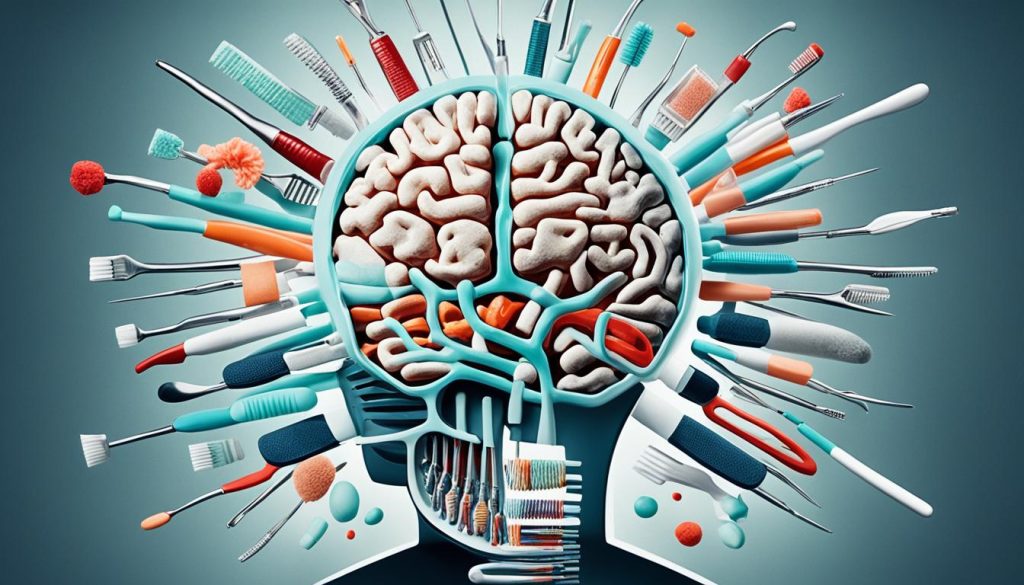Growing evidence suggests a potential connection between oral health and Alzheimer’s disease, a progressive neurodegenerative disorder that affects millions of people worldwide. Research indicates that maintaining good dental hygiene may play a crucial role in reducing the risk of cognitive decline and the onset of dementia. In this article, we will delve into the latest findings on the link between poor dental hygiene and Alzheimers disease.
Link Between Poor Dental Hygiene and Alzheimers Disease
- Poor dental hygiene may be associated with an increased risk of Alzheimer’s disease.
- Chronic gum disease, or periodontal disease, has been linked to the development of Alzheimer’s disease and related dementias.
- Bacteria associated with gum disease can potentially infect the brain and contribute to neurodegeneration.
- Oral bacteria have been found in the brains of Alzheimer’s patients, suggesting a possible connection.
- Chronic inflammation caused by gum disease can trigger neuroinflammation and contribute to Alzheimer’s disease.
The Impact of Gum Disease on Alzheimer’s Risk
Gum disease, specifically periodontitis, affects a significant portion of the population and is associated with the development of Alzheimer’s disease. The bacteria that cause gum disease can travel through the bloodstream to the brain, potentially contributing to the cascade of events that leads to dementia. Studies have shown that older adults with signs of periodontitis are more likely to develop Alzheimer’s. However, it is important to note that population studies can only show association, not causality. Clinical trials are needed to confirm the relationship between gum disease and Alzheimer’s.

Gum disease, also known as periodontal disease, is a common oral health condition characterized by inflammation and infection of the gums and supporting tissues of the teeth. It is caused by the accumulation of plaque, a sticky film of bacteria that forms on the teeth and gums. If left untreated, gum disease can lead to the destruction of the tissues and bones that support the teeth, resulting in tooth loss.
Recent studies have suggested a potential link between gum disease and Alzheimer’s disease. The bacteria that cause gum disease can enter the bloodstream and travel to the brain, where they may contribute to the development of Alzheimer’s. This connection between oral health and brain health highlights the importance of maintaining good dental hygiene and regular dental check-ups.
Dental Hygiene and Mental Decline
Poor oral hygiene, including inadequate brushing and flossing, can lead to the buildup of plaque and the development of gum disease. Research has shown that individuals with poor oral hygiene may be at an increased risk of cognitive decline and Alzheimer’s disease. The inflammatory response triggered by gum disease can cause chronic inflammation in the body, including the brain. This chronic inflammation has been linked to an increased risk of neurodegenerative diseases, such as Alzheimer’s.
Furthermore, studies have suggested that maintaining good dental hygiene, including regular brushing, flossing, and professional cleanings, may help reduce the risk of developing Alzheimer’s disease. By preventing gum disease and reducing inflammation in the body, proper dental care may contribute to overall brain health and cognitive function.
Oral Health and Brain Health
The connection between oral health and brain health goes beyond the link between gum disease and Alzheimer’s disease. Poor oral hygiene has also been associated with other cognitive impairments and conditions, such as dementia. Maintaining good oral hygiene, including brushing twice a day, flossing daily, and visiting the dentist regularly, is essential for preserving both oral and cognitive health.
- Brushing: Proper brushing technique is necessary to remove plaque and prevent gum disease. Use a soft-bristled toothbrush and fluoride toothpaste to brush your teeth for two minutes, twice a day.
- Flossing: Flossing helps remove plaque and food particles from between the teeth and along the gumline. It should be done at least once a day.
- Regular dental check-ups: Visiting the dentist regularly allows for early detection and treatment of oral health problems, including gum disease.
By maintaining good oral hygiene and addressing any dental issues promptly, you can help reduce the risk of not only gum disease but also Alzheimer’s disease and other cognitive decline conditions.
Bacteria and Brain Infection
Research has shown that oral bacteria, including those associated with gum disease, can potentially infect the brain and contribute to neurodegeneration in Alzheimer’s disease. Studies have detected the presence of bacterial DNA in the brains of individuals with Alzheimer’s, as well as in their cerebrospinal fluid. Furthermore, toxic enzymes produced by these oral bacteria have been found in the brains of Alzheimer’s patients, and these enzymes are correlated with the accumulation of amyloid beta protein, a hallmark of the disease.
This evidence suggests a potential connection between oral bacteria and Alzheimer’s disease. However, further research is necessary to fully understand the mechanisms through which oral bacteria may contribute to the development and progression of Alzheimer’s. Scientists are actively working to uncover the specific role of these bacteria in the brain and their impact on neurodegeneration.
While the relationship between oral bacteria and Alzheimer’s is still being explored, these findings emphasize the importance of maintaining good dental health. Proper oral hygiene practices, such as regular brushing, flossing, and professional dental cleanings, can help reduce the presence of oral bacteria and minimize the risk of infection and inflammation in the brain.
It’s crucial to prioritize dental health as part of overall well-being. The connection between oral bacteria and Alzheimer’s disease highlights the potential impact of oral health on cognitive decline. By taking care of our teeth and gums, we can potentially contribute to brain health and reduce the risk of developing Alzheimer’s disease.
Chronic Inflammation and Neuroinflammation
The chronic inflammation associated with gum disease can extend beyond the mouth and lead to chronic neuroinflammation in the brain. Inflammation in the body, including the gums, can trigger a cascade of events that contribute to neurodegeneration and Alzheimer’s disease.
Poor oral hygiene and dental care have been linked to an increased risk of developing Alzheimer’s. Maintaining good oral hygiene remains an important aspect of overall health.
The relationship between oral health and dementia is complex, as there are confounding factors such as lifestyle, smoking, and educational level that affect both oral and cognitive health.

Conclusion
As ongoing research explores the connection between poor dental hygiene and Alzheimer’s disease, it is becoming increasingly clear that maintaining good oral health is crucial for overall well-being. While there is evidence suggesting a link between gum disease and the development of Alzheimer’s, further studies are needed to establish causality. However, taking proactive steps to prioritize dental care can potentially reduce the risk of this debilitating disease.
By practicing proper dental hygiene, such as regular brushing, flossing, and visiting the dentist for check-ups, individuals can contribute to their overall oral health and potentially improve their brain health. The association between oral health and dementia highlights the importance of raising awareness about the impact of dental health on cognitive function.
Implementing a comprehensive approach to oral care, including maintaining good oral hygiene practices and seeking regular dental care, can play a significant role in promoting dental health and potentially reducing the risk of Alzheimer’s disease. By paying attention to our oral health, we can take a proactive step towards protecting our overall well-being and potentially preventing cognitive decline associated with Alzheimer’s.
FAQ
Is there a link between poor dental hygiene and Alzheimer’s disease?
Recent research suggests that there may be a link between poor dental hygiene and Alzheimer’s disease. While the exact nature of this relationship is still being studied, maintaining good oral health is important for overall well-being and may potentially reduce the risk of Alzheimer’s.
Can gum disease increase the risk of developing Alzheimer’s?
Yes, studies have shown an association between gum disease, specifically periodontitis, and the development of Alzheimer’s disease. The bacteria that cause gum disease can travel to the brain and potentially contribute to the cascade of events that lead to dementia.
How do oral bacteria and dental plaque relate to Alzheimer’s?
Research has found that oral bacteria, including those associated with gum disease, can infect the brain and potentially contribute to neurodegeneration in Alzheimer’s disease. Studies have detected the DNA of these bacteria in the brains of Alzheimer’s patients, as well as in their cerebrospinal fluid.
Does poor oral hygiene contribute to cognitive decline and dementia?
There is evidence to suggest that poor oral hygiene and dental care can increase the risk of cognitive decline and dementia, including Alzheimer’s disease. Maintaining good oral hygiene practices and regular dental check-ups is important for both oral and cognitive health.
What is the relationship between oral health and Alzheimer’s disease?
The connection between oral health and Alzheimer’s disease is an area of ongoing research. While there is evidence suggesting a link between oral health, such as gum disease, and the development of Alzheimer’s, further studies are needed to establish causality. Raising awareness about the association between oral health and dementia is important for promoting overall well-being.




